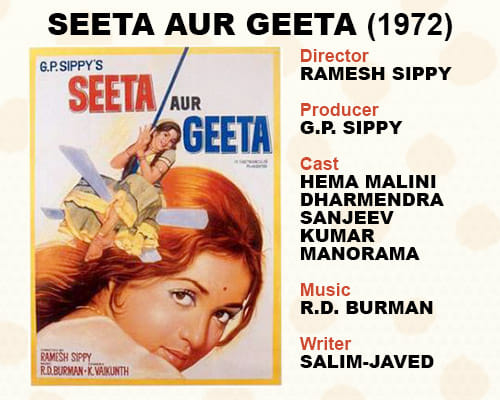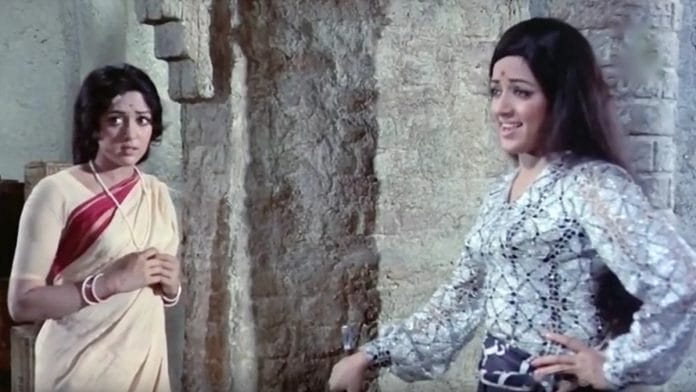Hema Malini ruled the film from start to finish, which also starred reigning superstar Dharmendra and Sanjeev Kumar.
In the history of Hindi cinema, few female actors have enjoyed box office swag as Hema Malini did, the legend who turned 70 a few days ago.
Hema Malini saw many milestones in her five-decade long career, but none like Seeta Aur Geeta (1972). Ramesh Sippy’s second directorial venture was a loose remake of Ram Aur Shyam (1967), and she stepped into the shoes of the great Dilip Kumar. It couldn’t have been more daunting for the south Indian actress, working in a language not her own. Except, it wasn’t.
Also read: Superstar Dilip Kumar was the ‘Thug of Hindostan’ in 1968 hit film Sunghursh
Hema Malini played the double role in a way that almost all major stars who came after her found hard to match up to.
The wildly successful film, written by the screenwriting duo Salim-Javed, was about twin sisters separated at birth – Seeta, the meek one and Geeta, the feisty one.
 Geeta, a street performer, lives in a poor neighbourhood while Seeta lives with her cruel but rich aunt Chachi (Manorama) and uncle. Raised in a rough environment by Chachi, Seeta decides to commit suicide. In the ensuing commotion, Seeta takes the place of Geeta in the poor neighbourhood while Geeta finds herself at the mercy of Chachi.
Geeta, a street performer, lives in a poor neighbourhood while Seeta lives with her cruel but rich aunt Chachi (Manorama) and uncle. Raised in a rough environment by Chachi, Seeta decides to commit suicide. In the ensuing commotion, Seeta takes the place of Geeta in the poor neighbourhood while Geeta finds herself at the mercy of Chachi.
It can be called a succinct Bollywood version of American writer Mark Twain’s 19th century novel The Prince and the Pauper.
In the whole mix-up, Geeta realises that her lookalike Seeta has probably lived her entire life suffering the abuse of the cruel Chachi. So, Geeta sets out to teach the aunt a lesson or two. In one of the most memorable scenes in the film, Geeta is perched on top of a ceiling fan of a police station. The aunt is mock-pleading with her to come home.
Chachi: Neeche aa jaa beti (Please come down, daughter)
Geeta: Upar aa jaa moti (Why don’t you come up fatty?)
https://www.youtube.com/watch?v=2aKts3K2kTI
Geeta’s love interest is a rich Ravi (Sanjeev Kumar) while Seeta finds her companion in Geeta’s childhood friend Raka (Dharmendra).
The rest of it is about fighting the numerous (funny) villains and finding the right course for their respective lives.
Dharmendra was the reigning star of the time. Sanjeev Kumar did his part in memorable songs and scenes too. But ask anyone about what they remember from the film and no one would take a name other than Hema Malini. She ruled the film from start to finish.
Also read: Ankhen, India’s first big spy film had a Doctor, Madam, Captain, and of course, Lily
They might also recall a couple of peppy fun R.D. Burman-Anand Bakshi numbers, particularly ‘Hawaa Ke Saath Saath’.
Repurposed stories are so regular in Hindi films that it almost seems like a tradition. The separated-twin formula is foremost among this tradition.
After the runaway success of Ram Aur Shyam, the idea has been used in at least six more films. Name any big star and they have done these twin-trouble dramas.
Jeetendra (Jaise Ko Taisa), Sridevi (Chaalbaaz), Anil Kapoor (Kishen Kanhaiya), Salman Khan (Judwaa), Kajol (Kuch Khatti Kuch Meethi), and Varun Dhawan (Judwaa 2).
Only one of these bombed, others were all reasonably successful. But only Sridevi proved to be the true inheritor of Hema Malini’s legacy and managed to own the characters in a definitive way.
Career assessment of film artistes in media is almost a futile exercise, given the unnecessary weight journalists and critics award to serious work. Lighter films like Seeta Aur Geeta somehow never seem ‘enough’ for anyone. An artiste’s work, however, is beyond this easy dichotomy.
Also read: Long before India’s #MeToo, Pati Patni Aur Woh thought workplace harassment was funny
Seeta Aur Geeta came much before the ‘dream-girl’ persona took over Hema Malini’s performances. It showcased her acting talent in a way that few films did in the ensuing years. Few of her films have found the kind of universal love that Seeta Aur Geeta did. And its legacy in mainstream, star-driven cinema is undeniable even today.







Hawa ke sang sang, ghata ke saath saath. 46 years have passed. Seems like yesterday.